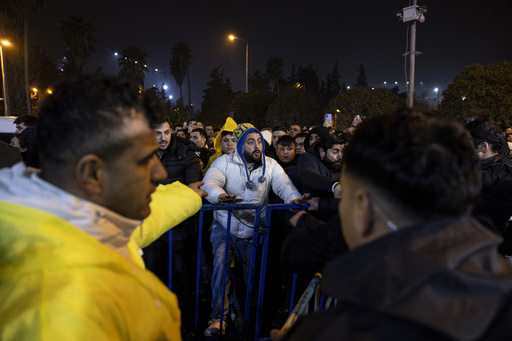ANKARA, Turkey — It has been two years since a catastrophic earthquake struck Turkey’s southern region, but for survivors like Omer Aydin, the trauma and memories are still vivid. Aydin, a single father of three, is facing his third winter living in a temporary housing unit resembling a shipping container. This year, he wrestles with both the financial strain of a nationwide cost-of-living crisis and the emotional toll of the disaster.
On February 6, 2023, a powerful 7.8 magnitude earthquake, followed by a second tremor, wreaked havoc across 11 provinces in southern and southeastern Turkey. The disaster resulted in over 53,000 fatalities in Turkey alone and claimed another 6,000 lives in the northern regions of Syria. This incident has been recognized as one of the most tragic calamities in the country’s history.
Omer Aydin, 51, an electrician, recounted how the traumatic sounds of the earthquake resonate in his mind. “The noise of collapsing homes and the desperate cries for help… I still shudder when I recall these moments,” he expressed during a phone conversation. His family, which includes his elderly mother and children, narrowly escaped injury when their home in Iskenderun, located in the badly affected Hatay province, fractured. They endured four days in frigid conditions under a makeshift tent fashioned from plastic sheets and wood.
Aydin currently resides in a temporary settlement known as a “container city” in Iskenderun. He struggles on a meager state pension, which hardly provides for his family’s needs. Although he occasionally finds work as an electrician, he notes that job opportunities in the area are limited. Being the family’s only breadwinner adds to his woes; his 26-year-old son is undergoing cancer treatment, necessitating regular trips to a hospital in Adana, approximately 135 kilometers (84 miles) away. His youngest child is in school, while his middle son awaits commencement of his military service. Daily life in the container city is a challenge, with inadequate sanitary conditions compounding their difficulties.
Aydin’s family is expected to qualify for one of many government-built houses currently underway, but he harbors worries about the costs of furnishing the new place and managing utility bills. “I don’t even possess a pin; what will I do once I move in?” he lamented.
On a recent Thursday, people gathered at mosques to hold special prayers honoring those lost in the earthquake. Survivors visited cemeteries to commemorate their deceased loved ones, laying carnations on graves and offering condolences to others. A minute of silence was observed at 4:17 a.m., the time when the earthquake struck, with eerie echoes of cries for help resonating through the gatherings.
In Kahramanmaras, the earthquake’s epicenter, mourners congregated at the ruins of a large residential complex where around 1,400 individuals lost their lives. Tensions flared in Antakya, Hatay’s provincial capital, when police enforced barriers that prevented mourners from marching to a central square. Eventually, these barriers were removed, enabling attendees to place flowers in the Orontes River.
Turkish President Recep Tayyip Erdogan attended a remembrance event in Adiyaman, a city that suffered over 8,000 deaths. He announced the government’s initiative to build a total of 453,000 residential and commercial units by the end of 2025. He assured that every citizen would find shelter and reclaim their businesses. Following his speech, families received keys to their new homes.
Justice Minister Yilmaz Tunc reported that 118 individuals have been sentenced for negligence related to the disaster, with over 1,300 ongoing prosecutions addressing violations of zoning laws. According to Jessie Thomson, head of the International Federation of Red Cross and Red Crescent Societies in Turkey, nearly half a million people are still residing in temporary container cities, facing immense hurdles in securing stable incomes, leading to rising levels of depression and hopelessness. “The path to recovery is long and challenging, necessitating ongoing support and solidarity,” Thomson stated.
Aydin confided that he often prays to not wake up each morning, hoping to escape the hardships of his current life. “I truly do pray to God not to awaken the next day,” he shared.
Meanwhile, Songul Erol, a 29-year-old mother with two young daughters, aged 7 and 3, is gradually rebuilding her life in Samandag, another town in Hatay province. After months of living in tents and container homes, she received financial support from the Turkish Red Crescent to open a shop specializing in bait, nets, and fishing gear. She has converted part of her shop into a living space for herself and her daughters, who suffered from allergies exacerbated by their living conditions.
Haunted by the images of collapsing buildings in Samandag, Erol articulated her singular aspiration: “My dream is to have a single-story house that isn’t adjacent to other apartment buildings.”



